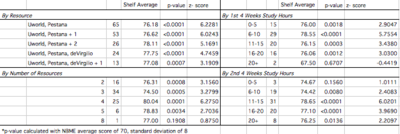C4 - 09: BEST STUDY STRATEGY FOR NBME CLINICAL SCIENCE SURGERY EXAM
Anne Kelly Rhudy, Angela Volk, MD, Christopher DuCoin, MD, MPH; Tulane University School of Medicine
Introduction: The NBME Clinical Science Surgery exam provides educators with a standardized assessment tool for medical students as well as feedback on the performance of the examinees. Due to the nature of the varied clinical services and experiences had by students during the surgical clerkship, it is important to develop a strategy to suggest to students so they can perform as best as possible. As of yet, there has not been a specific inquiry into a studying strategy for this exam. As such, we aim to answer 1) do certain popular study materials affect NBME raw scores 2) does the number of study materials affect NBME raw scores and 3) does the amount studying during certain time periods of the clerkship affect NBME raw scores.
Methods: Over the period of one academic year, students were polled regarding study materials used and study hours per week. The data was then matched to their raw NBME score and then depersonalized. A total of 82/193 students responded with an overall average raw score of 76.74. Table 1 highlights the study variable, shelf average, p-value and z-score.
Results: By comparing our data to the NBME national average of 70 and standard deviation of 8 a z-test was used to compare the population mean to our sample means. Since every variable, except 2 were calculated as statistically significant a z-score was used to determine the best study strategy. A higher z-score would indicate a better outcome compared to the national average.
Conclusion: In conclusion, the study strategy with the best outcome compared to the national average was to use 4 study materials, most commonly UWorld, Pestana, deVirgilio and “Other”. In terms of study hours, the highest average was attributed to studying 6-10 hours/week the first 4 weeks and then 11-15 hours/week the second 4 weeks. 
